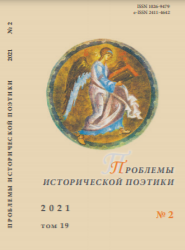Mифологема «Светлый Град» в лирике Пимена Карпова
The “Bright City” Mythologeme in Lyric Poetry of Pimen Karpov
Author(s): Natalia Z. Kokovina, Irina P. MikhailovaSubject(s): Christian Theology and Religion, Studies of Literature, Recent History (1900 till today), Russian Literature, 19th Century
Published by: Петрозаводский государственный университет
Keywords: Pimen Karpov; myhtologeme; Bright City (Svetly Grad); the new peasant poetry; toponymy; sacred space; eschatological narrative;
Summary/Abstract: The article analyzes the poet Pimen Karpov’s understanding of the “Bright City” mythologeme. The need to analyze this mythologeme stems from the fact that the image of the Bright City is at the core of the mythopoetic concept that forms the basis of Karpov’s worldview. The toponymy of the sacred space of the Bright City, the Heavenly City, the City of God in Karpov’s lyric poetry is multifaceted. It is realized in poetry both as a real earthly space, and as a certain symbol with blurry borders: it is a heavenly city, a potential paradise on earth, the promised land, the land of the forefathers, and even simply the land for the peasant. The ideal world order has both spatial and temporal reference points. According to Karpov, it is only possible to reach the Bright City through self-sacrifice. Out of pain and suffering, happiness is born, and this is the only possible way to attain the coveted Paradise. But for Karpov, it is not merely a personal path, but also Russia’s path, its mission, and the lyrical hero’s participation in its fate is undeniable. Karpov sees Russia’s historical mission in sacrificial self-immolation as a path to Transformation. The paradoxical convergence of Christ and the antichrist in his works reflects the spiritual context of the turn of the 20th century, i.e., the extreme ambivalence of personal principles. The fragmentary and aphoristic nature of Karpov’s poetic language, the kaleidoscopic nature of his artistic space, on the one hand, and the hidden integrity emanating from the unity of the visible and invisible worlds, on the other, make his poetry akin to the culture of modernism.
Journal: Проблемы исторической поэтики
- Issue Year: 19/2021
- Issue No: 2
- Page Range: 235-250
- Page Count: 16
- Language: Russian

